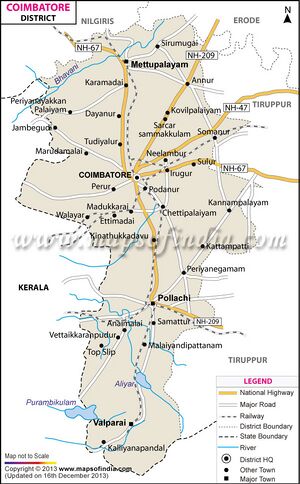Coimbatore

Coimbatore (कोयंबटूर) is a city and district in the Indian state of Tamil Nadu.
Variants
Location
It is located on the banks of the Noyyal River and surrounded by the Western Ghats. Coimbatore is the second largest city in Tamil Nadu after Chennai.
The city is one of the largest exporters of jewellery, wet grinders, poultry and auto components; the "Coimbatore Wet Grinder" and the "Kovai Cora Cotton" are recognised as Geographical Indications by the Government of India.
Origin of name
- According to one theory, "Coimbatore" is a derivation of Kovanputhur (literally 'new town of Kovan'), after chieftain Kovan or Koyan, evolved into Koyambatoor and later anglicised as Coimbatore.[1]
- Koyamma, the goddess worshipped by Koyan evolved into Koniamma and later Kovaiamma. Another theory states that the name could have been derived from Kovaiamma.[2]
History
Coimbatore was part of Kongu Nadu during the Sangam period between c. 1st and the 4th centuries CE and was ruled by the Cheras as it served as the eastern entrance to the Palakkad Gap, the principal trade route between the west coast (Kerala) and (Tamil Nadu). Coimbatore was located along the ancient trade route that extended from Muziris to Arikamedu in South India.
The medieval Cholas conquered the Kongu Nadu in the 10th century CE. The region was ruled by Vijayanagara Empire in the 15th century followed by the Nayaks who introduced the Palayakkarar system under which Kongu Nadu region was divided into 24 Palayams. In the later part of the 18th century, the Coimbatore region came under the Kingdom of Mysore and following the defeat of Tipu Sultan in the Anglo-Mysore Wars, the British East India Company annexed Coimbatore to the Madras Presidency in 1799. The Coimbatore region played a prominent role in the Second Poligar War (1801) when it was the area of operations of Dheeran Chinnamalai.
In 1804, Coimbatore was established as the capital of the newly formed Coimbatore district and in 1866, it was accorded municipality status with Robert Stanes as its Chairman. 24 November used to be Coimbatore Day, say those familiar with the history of Coimbatore.[3]
The city experienced a textile boom in the early 19th century due to the decline of the cotton industry in Mumbai.
Post - Independence, Coimbatore has seen rapid growth due to industrialisation including the introduction of 3 malls in major locations.
Notable persons
- Jat Samaj Coimbatore
External links
References
- ↑ "Coimbatore: turning modern, yet retaining its old charm". The Hindu. 18 June 2011
- ↑ Whitehead, Henry (1921). The Village Gods of South India. Read Books. pp. 121–2. ISBN 978-1-4067-3214-6.
- ↑ "Coimbatore Day celebrated". The Hindu. Special Correspondent. 25 November 2017. ISSN 0971-751X.

